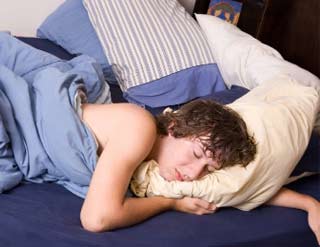
The investigators gauged the time of going to sleep and waking times of almost more than 2000 individuals in the age-group 9 to 16 years and compared their activity during leisure hours and their weight. As per the results, even if the teens slept for the same amount of time, youngsters who went to bed early and woke up early seemed to be trimmer and fitter than their nocturnal counterparts.
“We found that kids who went to bed late and got up late were 1.5 times more likely to become obese and 2.9 times more likely to be physically inactive. The night owls more often spent their free time playing computer or video games, watching TV or engaged in other sedentary or screen-based activities.While scientists have already made the connection between less sleep and poor health outcomes around obesity and fitness, what is interesting and new here is that the timing of sleep may be an important factor in predicting health in young people,†elaborated Dr Carol Maher.
He added that teenagers are likely to sleep in, so this trial informs teens on the negative consequences if they tend to go overboard on this front. Evenings are touted to comprise more of sedentary activities like online gaming, social networking and so on. Therefore, when adolescents stay awake till late in the night, they probably miss early mornings that are to be utilized for physical sports and activities.
The analysts found that young people who were habituated of going to bed early, apparently woke up earlier than their peers who slept late. They also seemed to be exposed to 27 minutes more physical exertion every day. On the other hand, their owl peers appeared to spend an extra 48 minutes online or other indoor activities than the aforesaid group.
This shows that a solid 30 minute everyday activity that could be spent in vigorous sports was supposedly being used to do sedentary work by those who sleep late. This is validated as well, as the night owls seemingly had greater BMI and were likelier to be overweight and obese. The latter were the ones to live in main cities and from homes where they were allowed to work part-time and had few siblings.
This study may inform teens on working towards their health and well-being. It is published in the journal Sleep.
